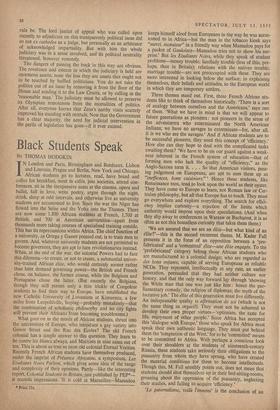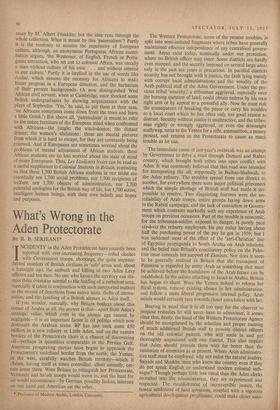Black Students Speak
By THOMAS HODGKIN IN London and Paris, Birmingham and Bordeaux, Lisbon and Louvain, Prague and Berlin, New York and Chicago, African students go to lectures, read, have bread and coffee for breakfast, meet in cafés, join societies, attend con- ferences, sit in the inexpensive seats at the cinema, opera and ballet, fall in love, write poetry, argue through the night. drink, sleep at odd intervals, and otherwise live as university students are accustomed to live. Since the war the Niger has flowed into the Seine and the Volta into the Thames. There are now some 1,800 African students at French, 1,700 at British, and 700 at American universities—apart from thousands more taking courses of specialised training outside. This has its repercussions within Africa. The chief function of a university, as Ortega y Gasset pointed out, is to train men to govern. And, wherever university students are not permitted to become governors, they are apt to turn revolutionaries instead. When, at the end of the war, the colonial Powers had to face this dilemma—to create, or not to create, a substantial univer- sity-trained African elite, who would certainly sooner rather than later demand governing power—the British and French chose, on balance, the former course, while the Belgians and Portuguese chose the latter. (But recently the Belgians, though they still permit only a thin trickle of Congolese students to find their way to Europe, have established the new Catholic University of ,Lovanium at Kimuenza, a few miles from Leopoldville, hoping—probably mistakenly—that the combination of scholastic philosophy and no city lights will prevent their Africans from becoming troublesome.) What goes'on in the minds of African students, thrust into the universities of Europe, who introduce a gay variety into Gower Street and the Rue, des Ecoles? The old French colonial has a simple answer to this question. They learn to be contre les blancs always, and Marxists in nine cases out of ten. This is about as true as most old colonial Eternal Verities, Recently French African students have themselves produced, under the imprint of Presence Africaine, a symposium, Les Etudiants Noirs Parlent, which gives some idea of the range and complexity of their opinions. Partly—like the interesting report, Colonial Students in Britain, just published by PEP*— it records impressions. `It is cold at Marseilles—Mamadou keeps himself aloof from Europeans in the way he was accus- tomed to in Africa—but the man in the tobacco kiosk says "merci, monsieur" in a friendly way when Mamadou pays for a packet of Gauloises—Mamadou tries not to show his sur- prise.' But les Etudiants Noirs, while they speak of student problems—money trouble; landlady trouble (less of this, per- haps. than in Britain); relations with the natives trouble; marriage trouble—are not preoccupied with these. They are more interested in looking below the surface; in explaining themselves, their beliefs and attitudes, to the European world in which they are temporary settlers.
Three themes stand out. First, these French African stu- dents like to think of themselves historically. 'There is a sort of analogy between ourselves and the Americans,' says one of them. `What we have in mind is that we will appear to future generations as pioneers : not pioneers in the sense of the adventurers who exterminated the North American Indians; we have no savages to exterminate—for, after all, it is we who are the savages.' And if African students are to be successful pioneers, they need this concept of 'efficiency.' How else can they hope to deal with the complicated tasks awaiting them? 'We have to be on our guard against a weak- ness inherent in the French system of education—that of forming men who lack the quality of "efficiency," as the Anglo-Saxons term it. . . . So that American visitors, pass- ing judgement on Europeans, are apt to sum them up as "inefficaces, bans cuisiniers."' Hence these students, like Renaissance men, tend to look upon the world as their oyster. They have come to Europe to learn, not Roman law or Car- tesian philosophy, but all that Europe has to teach. They must go everywhere and explore everything. The search for effiCi- ency implies curiosity—a rejection of the limits which authority would impose upon their speculations. (And when they slip away to conferences in Warsaw or Bucharest, it is as often as not this boundless curiosity that takes them there.) `We are assured that we are an elite—but what kind of an elite?'—this is the second recurrent theme. M. Kader Fall presents it in the form of an opposition between a 'pre- fabricated' and a 'committed' elite—une elite engagee. To the `prefabricated' category belong those African students who are manufactured to a colonial design; who are regarded as des bons enfants; capable of serving Europeans as reliable NCOs. They represent, intellectually at any rate, an earlier generation, persuaded that they had neither culture nor history, and that the only way forward lay through `showing the White man that one was just like him : hence the par- liamentary comedy; the religion of diplomas; the myth of the lucrative job.' The elite of this generation must live differently. An indispensable quality is affirmation de soi (which is not the same thing as orgueil). They must not be ashamed to develop their own proper virtues—`optimism, the taste for life, enjoyment of other people.' Since Africa has accepted this `dialogue with Europe,' those who speak for Africa must speak their own authentic language. They must put behind them the `temptation of the West,' for to be `committed' means to be committed to Africa. With perhaps a conscious look over their shoulders at the students of nineteenth-century Russia, these students take seriously their obligations to the peasantry from whom they have sprung, who have created the material conditions for them to become intellectuals. Though this, M. Fall sensibly points out, does not mean that students should shut themselves up in their bed-sitting-rooms, groaning about the oppression of the peasantry, neglecting their studies, and failing to acquire 'efficiency.'
• Price21s. 'Le paternalisme, voila l'enneme is the conclusion of an essay by M.\ Albert Franklin; but the idea' runs through the whole collection. What is meant by this 'paternalism'? Partly it is the tendency to assume the superiority, of European culture, although. an anonymous Portuguese African contri- bution argues, 'the Westerner, of English, French or Portu- guese extraction, who set out to colonise Africa, was usually a man without culture of his own . . . and without interest in our culture.' Partly it is implied in the use of words like evolue, which assume the necessity for Africans to make linear progress in a European direction, and the barbarism of their present backgrounds. (A now distinguished West African civil servant, when at Cambridge, once shocked some British undergraduates by showing acquaintance with the plays of Sophocles. 'Yes,' he said, to put them at their ease, 'we Africans sometimes come down from the trees and learn a little Greek.') But above all, 'paternalism' is meant to refer to the entire furniture of the European mind when confronted with Africans—the jungle; the witch-doctor; the distant drums; the women's ululations : these are mental pictures from which it is hard to escape, for they are constantly being renewed. And if Europeans are sometimes worried about the problems of mental adjustment of African students, these African students are no less worried about the state of mind of many Europeans. Thus, Les Etudiants Noirs can be read as a useful supplement to Colonial Students in Britain, reminding us that these 1,700 British African students in our midst are essentially not 1.700 social problems, nor 1,700 recipients of welfare, nor 1.700 objects of administration. nor 1,700 potential apologists for the British way of life, but 1,700 active, intelligent human beings, with their own beliefs and hopes and purposes.



































 Previous page
Previous page